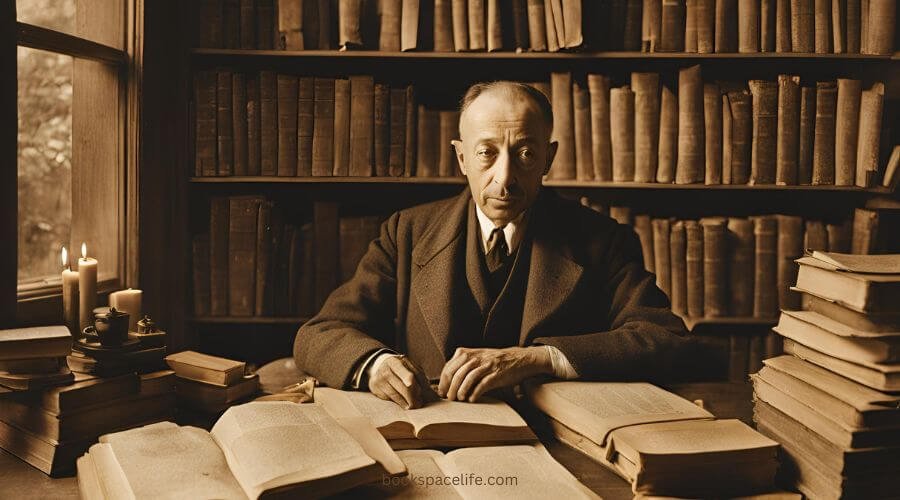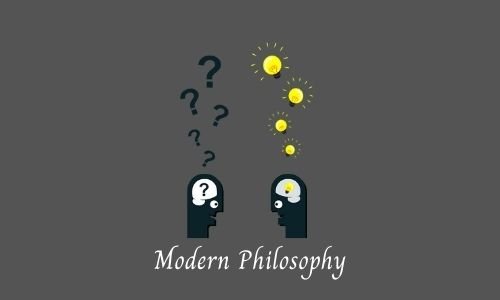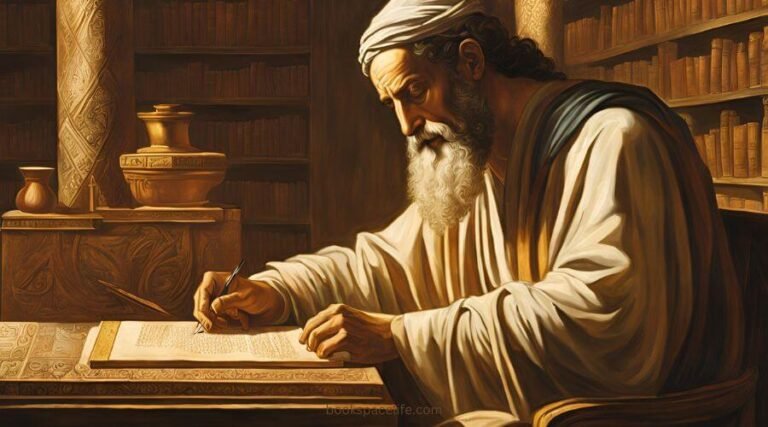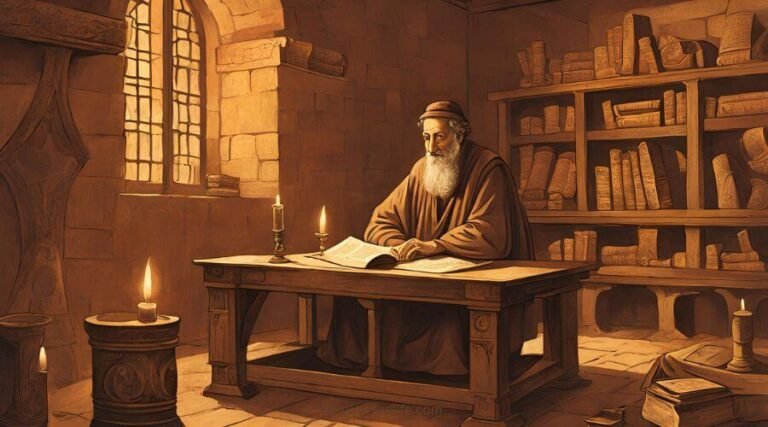Philo of Alexandria
Gershom Scholem: Pioneering Scholar of Jewish Mysticism
Gershom Scholem (1897 – 1982 CE) is widely recognized as the founder of the academic study of Jewish mysticism, and his contributions have transformed our understanding of Kabbalah, Hasidism, and Jewish esotericism.
Scholem’s groundbreaking research restored the study of mysticism to its central place within Jewish history and thought.
By doing so, he not only reinvigorated Jewish studies but also offered an entirely new perspective on Jewish spirituality and cultural identity.
This post explores Scholem’s life, his philosophical journey, and the enduring impact of his work.
Table of Contents
(1) Early Life and Education
Gershom Scholem was born on December 5, 1897, in Berlin, Germany, into a secular Jewish family.
His father, a printer, held traditional German nationalist beliefs, while his mother maintained a strong sense of Jewish identity.
This difference in values between his parents had a significant influence on Scholem, who, from a young age, felt a need to reconcile his Jewish heritage with the secular, German context in which he was raised.
Unlike many Jewish families of his time, the Scholems were relatively disconnected from Jewish traditions, a situation Gershom would seek to change by exploring Jewish spirituality and history in a deep and meaningful way.
Scholem’s interest in Jewish mysticism began in his teenage years when he started learning Hebrew and studying Talmud and Kabbalistic texts.
He was captivated by Jewish mystical thought and dissatisfied with the rationalist interpretations of Judaism offered by mainstream Jewish scholarship in Germany.
This early interest drove him to pursue an academic path that, at the time, seemed unconventional and even risky.
Scholem studied at several German universities, including the University of Berlin, where he was exposed to various intellectual movements and influential thinkers.
During his university years, Scholem developed friendships with notable figures such as Walter Benjamin, who would become an important influence on his thought.
Through Benjamin and other intellectuals, Scholem encountered critical social, political, and philosophical ideas, from Marxism to German Romanticism.
However, while he engaged with these ideologies, he always returned to his fascination with Jewish mysticism as a source of profound wisdom and historical insight.
(2) Emigration to Palestine and Academic Career
With the rise of antisemitism and growing political instability in Germany, Scholem emigrated to British Mandate Palestine in 1923, where he became one of the first faculty members of the Hebrew University of Jerusalem.
His move was not solely motivated by political concerns; Scholem was also drawn by Zionist ideals and the vision of a Jewish homeland in which Jewish culture and scholarship could thrive.
At the Hebrew University, Scholem established himself as a pioneering scholar and began his life’s work on Kabbalah and Jewish mysticism.
Scholem’s position in Jerusalem allowed him access to vast collections of Jewish manuscripts, and he dedicated himself to studying, cataloging, and interpreting Kabbalistic texts that had been largely ignored or misunderstood by previous scholars.
At a time when most academics regarded Kabbalah and Jewish mysticism as fringe or superstitious elements within Judaism, Scholem argued that these mystical traditions were central to Jewish thought and identity.
His work elevated the study of Kabbalah, demonstrating its profound influence on Jewish history, theology, and philosophy.
(3) Philosophical Contributions: Mysticism and Jewish Identity
Scholem’s primary academic focus was on the Kabbalah—a complex body of Jewish mystical teachings that emerged in medieval Spain and became a central component of Jewish spirituality.
His studies brought Kabbalistic works, such as the Zohar, into the spotlight, revealing the philosophical depth, creativity, and theological innovation embedded within them.
He examined how Kabbalah provided Jews with a framework for grappling with metaphysical questions, the nature of God, and the structure of the universe.
- Revelation and Secrecy: One of Scholem’s key ideas was the concept of revelation and the role of secrecy in Jewish mystical tradition. He argued that Kabbalists viewed divine revelation as something that could not be fully articulated in words but was instead accessed through symbols, meditation, and esoteric practices. Scholem saw this approach to revelation as a unique form of religious expression that preserved the mystery of the divine and allowed Kabbalah to develop as a secretive yet vibrant tradition.
- Creative Myth-Making: Scholem also challenged the view that Kabbalistic myths were primitive or irrational. Instead, he argued that these myths represented a creative reworking of Jewish theology and an imaginative way of confronting existential questions. By understanding God as an active, dynamic force rather than a static being, the Kabbalists created a mythology that could adapt to new circumstances and offer meaning during times of crisis.
- Tikkun and the Messianic Ideal: Another significant aspect of Scholem’s thought was his interpretation of tikkun (repair or restoration), a concept within Lurianic Kabbalah. According to Scholem, tikkun represents the process of restoring cosmic harmony after the “shattering of the vessels,” a mythological event in which divine light scattered into fragments. For Scholem, this concept reflected a vision of Jewish messianism that emphasized human responsibility in achieving redemption. Rather than waiting passively for a divine intervention, Kabbalists saw themselves as active participants in the world’s restoration, an idea that Scholem found profoundly compelling.
- Messianism and its Dangers: Scholem was also deeply interested in Jewish messianism, which he saw as a force of both spiritual renewal and potential chaos. In his work on Sabbateanism (a 17th-century messianic movement led by Shabbetai Zevi), Scholem argued that the messianic impulse, while inspiring, could lead to dangerous forms of radicalism and disruption. The disappointment that followed Shabbetai Zevi’s apostasy, for example, left lasting scars on Jewish communities. Through this analysis, Scholem highlighted the double-edged nature of messianism, capable of inspiring profound hope and spiritual energy but also vulnerable to fanaticism.
(4) Scholem’s Influence and Impact on Jewish Studies
Scholem’s contributions to the academic study of Jewish mysticism were revolutionary.
By examining mystical traditions as a central part of Judaism, he reshaped the field of Jewish studies, which had previously been dominated by historical and rationalist perspectives.
Scholem’s work offered a new way of understanding Judaism as a religion with a complex, multifaceted history that included mysticism, esotericism, and rich spiritual traditions.
- The Study of Jewish Mysticism: Scholem’s research established the field of Jewish mysticism as a legitimate area of academic inquiry. He demonstrated that Kabbalah and Hasidism were not merely superstitious or marginal practices but were integral to Jewish history and religious expression. Scholars and students who followed in Scholem’s footsteps have expanded on his work, examining Jewish mysticism’s influence on Jewish law, philosophy, and literature.
- Jewish Identity and Cultural Renewal: By reclaiming Kabbalah as a core part of Jewish heritage, Scholem contributed to a renewed sense of Jewish cultural identity. In an era when many Jewish intellectuals sought to assimilate or distance themselves from traditional practices, Scholem’s work reminded Jews of the richness and depth of their mystical traditions. His approach offered a pathway for modern Jews to engage with their heritage in meaningful ways, even if they did not adhere to traditional religious practices.
- Influence on Contemporary Thinkers: Scholem’s ideas about revelation, myth-making, and messianism have had a significant influence on contemporary philosophers and theologians. His close friend Walter Benjamin, for example, drew on Scholem’s insights into messianism and myth in his own work. Other thinkers, such as Jacques Derrida, have been influenced by Scholem’s views on secrecy, language, and the ineffable nature of divine revelation.
Critiques and Controversies
While Scholem is celebrated as the father of modern Jewish mysticism studies, his work has not been without its critics.
Some scholars argue that Scholem’s emphasis on mysticism marginalized other aspects of Jewish thought, such as rationalist or legal traditions.
Critics have also suggested that Scholem’s interpretation of Kabbalah as a quasi-revolutionary force may have been influenced by his own ideological inclinations, particularly his attraction to Zionism and Jewish nationalism.
Additionally, some argue that Scholem’s focus on esotericism and secrecy risks creating an overly mysterious image of Jewish mysticism, distancing it from the daily lives of ordinary Jews.
Despite these critiques, however, Scholem’s influence remains unparalleled, and his work continues to inspire new scholarship and debate within Jewish studies and beyond.
(5) Legacy and Lasting Impact
Gershom Scholem’s work left an indelible mark on Jewish studies and the understanding of Jewish spirituality.
His insights into Kabbalah and Jewish mysticism have had a lasting impact on fields such as religious studies, philosophy, and literary theory.
He opened the door for future scholars to explore aspects of Judaism that had long been neglected or misunderstood, creating a foundation for a richer, more inclusive understanding of Jewish history.
Scholem’s influence extends far beyond academia, affecting cultural and religious perceptions of Jewish mysticism worldwide.
In the modern era, where many Jews seek a connection to spirituality outside traditional structures, Scholem’s work has provided a pathway to rediscover mystical practices and ideas within the Jewish tradition.
His vision of Kabbalah as a dynamic, evolving tradition allows modern readers to find relevance in mystical texts that might otherwise seem archaic or inaccessible.
Scholem’s life and work remind us of the importance of recovering neglected traditions and reinterpreting them for contemporary audiences.
Through his scholarship, Gershom Scholem not only brought the mystical dimensions of Judaism into the academic spotlight but also revitalized them as a source of identity, meaning, and spiritual depth for Jewish and non-Jewish audiences alike.








